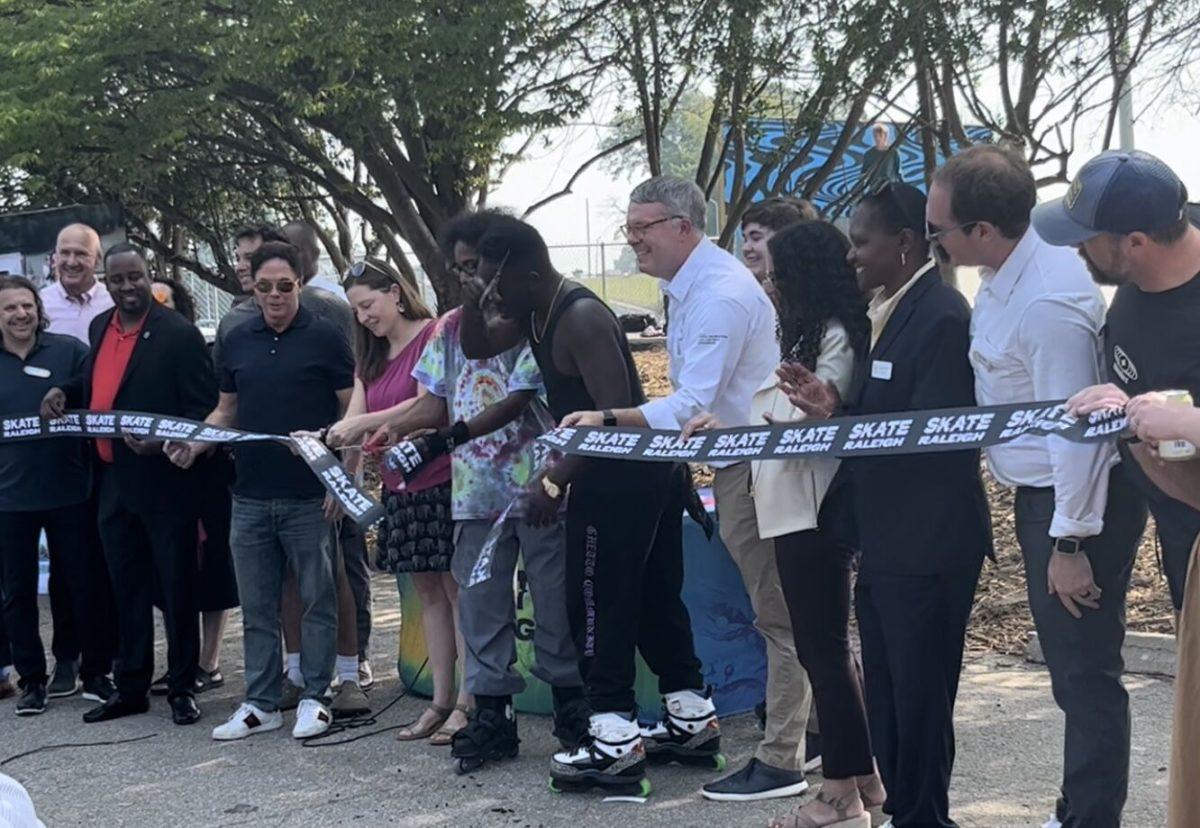Skateboarders, roller bladers and city officials cheered as Skate Raleigh organizers cut the ribbon in front of Conlon Family Skatepark in downtown Raleigh Thursday morning.
The ribbon cutting ceremony saw old and new wheels as adults dusted off their boards and kids rolled onto the pavement for the first time.
Originally the vision of Stephen Mangano and his son Adrian, the skatepark is the product of a 10-month collaboration between Skate Raleigh and the Parks, Recreation and Cultural Resources department.
Stephen Bentley, director of the Parks, Recreation and Cultural Resources for the city of Raleigh, said in an address at the event that skate parks benefit a wide range of the community population. He said the minimal equipment requirements for skating lowers barriers of entry to the sport and opens the door for all income levels and ages to participate.
Becky Seiler attended the event with her husband and two children. As Seiler’s oldest skated hand in hand with her father for support, Seiler said she was glad there was a space where her children could learn to skate.
“The fact that my kids can come here and feel welcome, I think that’s great,” Seiler said. “They don’t feel like it’s just for big kids.”
Joe Rana, a local technical salesman, rehabbed his 45-year-old board with fresh wheels, bushings and griptape to skate for the first time in 15 years at the new park. He said having a range of ages and levels skating together encourages growth.
“Skill sets go up much faster when you have people in one community spot,” Rana said. “Younger kids come out and they see a bunch of old pros, and I think that that’ll be the benefit of them coming out here to learn the skills faster.”
The low barrier to entry sets skating apart from other sports that are increasingly accessible only through pay-to-play leagues. Cody Charland, Skate Raleigh’s executive director and NC State alum, said this accessibility is one of skating’s draws.
“Sports is one of the most lopsided, unfair, inequitable avenues in society today,” Charland said. “Skating is one of these things that’s countercultural to that mindset.”
Despite the sport’s accessibility in terms of equipment, without designated skating facilities, skaters use the city as their park, often in spaces unwelcoming to skateboards. Jacques Gilbert, Apex mayor, retired police captain and supporter of the park, said after building a skate plaza in his own town, 100% of skateboard-related complaints to the police stopped.
“With the calls for service we were having, running young people away and writing tickets for trespassing, it just didn’t sit well with me,” Gilbert said. “Once we had the skate plaza built, the calls for service for skateboarders trespassing on properties in Apex just went away.”
Charland, along with Mangano, John Cerquiera and a large team of donors and volunteers, wanted to create a public space that’s location matched the accessibility of the sport.
Sitting in the northwest corner of downtown between Capital Boulevard and N West Street, the park is built on the future site of Smoky Hollow Park, in close proximity to several downtown businesses and neighborhoods.
Charland said he hopes as the closest skatepark to NC State’s campus, the new park will attract students and strengthen the skating community State includes.
Rather than leave the space an underused parking lot, Skate Raleigh enabled the location to be a hub of community-building in the years prior to construction of the future Smoky Hollow Park, which will be funded by the 2022 Parks Bond Referendum.
Bentley said the Conlon Family Skatepark was reflective of an exciting time for public spaces in the city.
“Our Parks Bond was approved last year,” Bentley said. “That’s [a] $275 million investment in public health, our mental health, our arts centers, our greenways, and it’s going to be done in a more equitable way than we have ever done in the history of Raleigh. We have 10,000 acres, 120 miles of greenways, aquatic centers, community centers, and today, we doubled the number of our skateparks.”








